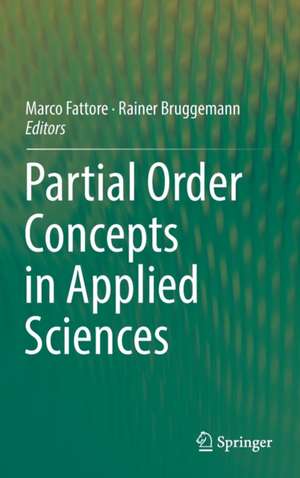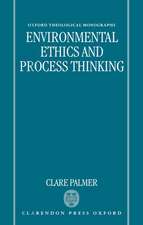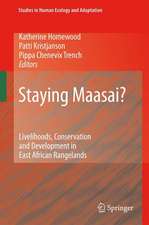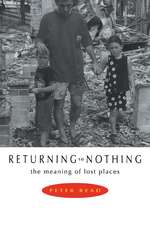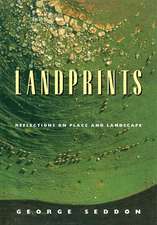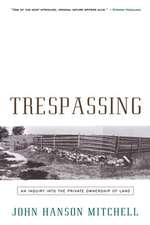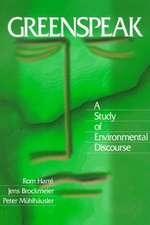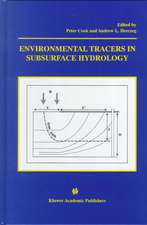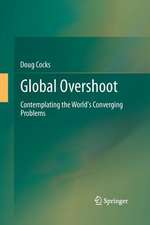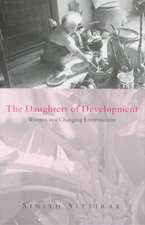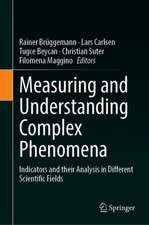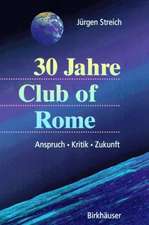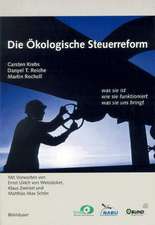Partial Order Concepts in Applied Sciences
Editat de Marco Fattore, Rainer Bruggemannen Limba Engleză Hardback – 27 dec 2016
Partial Order Concepts in Applied Sciences presents new theoretical and methodological developments in partial order for data analysis, together with a wide range of applications to different topics: multidimensional poverty, economic development, inequality measurement, ecology and pollution, and biology, to mention a few. The book is of interest for applied mathematicians, statisticians, social scientists, environmental scientists and all those aiming at keeping pace with innovation in this interesting, growing and promising research field.
| Toate formatele și edițiile | Preț | Express |
|---|---|---|
| Paperback (1) | 641.53 lei 6-8 săpt. | |
| Springer International Publishing – 7 iul 2018 | 641.53 lei 6-8 săpt. | |
| Hardback (1) | 647.92 lei 6-8 săpt. | |
| Springer International Publishing – 27 dec 2016 | 647.92 lei 6-8 săpt. |
Preț: 647.92 lei
Preț vechi: 762.26 lei
-15% Nou
Puncte Express: 972
Preț estimativ în valută:
123.99€ • 134.64$ • 104.16£
123.99€ • 134.64$ • 104.16£
Carte tipărită la comandă
Livrare economică 22 aprilie-06 mai
Preluare comenzi: 021 569.72.76
Specificații
ISBN-13: 9783319454191
ISBN-10: 3319454196
Pagini: 400
Ilustrații: XI, 307 p. 87 illus., 26 illus. in color.
Dimensiuni: 155 x 235 x 19 mm
Greutate: 0.63 kg
Ediția:1st ed. 2017
Editura: Springer International Publishing
Colecția Springer
Locul publicării:Cham, Switzerland
ISBN-10: 3319454196
Pagini: 400
Ilustrații: XI, 307 p. 87 illus., 26 illus. in color.
Dimensiuni: 155 x 235 x 19 mm
Greutate: 0.63 kg
Ediția:1st ed. 2017
Editura: Springer International Publishing
Colecția Springer
Locul publicării:Cham, Switzerland
Cuprins
Part I.Theoretical and methodological advances.- 1.Endowing posets with flesh: if, why and how?.- 2.Incomparability/inequality measures and clustering.- 3.Incomparable – what now, IV. Incomparabilities - a modeling challenge.- 4.Partial Ordering and Metrology Analyzing Analytical Performance.- 5.Functionals and synthetic indicators over finite posets.-
6.Evaluation, considered as problem orientable mathematics over lattices.- 7.A combined lexicographic-average rank approach for evaluating uncertain multi-indicator matrices with risk metrics.- Part II.Partial Order Theory in socio-economic sciences.- 8.Peculiarities in multidimensional regional poverty.- 9.Application of Partial Order Theory to Multidimensional Poverty Analysis in Switzerland.- 10.Analysis of social participation: a multidimensional approach based on the theory of partial ordering.- 11.POSET analysis of panel data with POSAC.- 12.Partially Ordered SetTheory and Sen’s capability approach: a fruitful relationship.- Part III.Partial Order Theory in environmental sciences.- 13.Ranking Chemicals with Respect to Accidents Frequency.- 14.Formal Concept Analysis applications in chemistry: from radionuclides and molecular structure to toxicity and diagnosis.- 15.Partial Order Analysis of the government dependence of the Sustainable Development Performance in Germany´s Federal States.- Part IV.New applications of Partial Order Theory.- 16.A matching problem, partial order and an analysis applying the Copeland index.- 17.Application of the Mixing Partial Order to Genes.- 18.Analysing ethnopharmacological data matrices on traditional uses of medicinal plants with the contribution of Partial Order Techniques.- Part V.Software developments.- 19.PARSEC: An R package for partial orders in socio-economics.- 20.PyHasse and cloud computing.
div>
Notă biografică
Marco Fattore, Degree in Theoretical Physics, Ph. D in Statistics, Assistant Professor in Applied Statistics, Department of Statistics and Quantitative Methods, University of Milano-Bicocca. His main research interests pertain to mathematical structures in data analysis, with a particular focus on Partial Order Theory and the measurement of multidimensional poverty and inequality. He also works on Big Data analysis and applied multivariate statistics in socio-economics.
Rainer Brüggemann has studied chemistry in the Ludwig-Maximilians University Munich (LMU) and received his PhD at LMU, in quantum chemistry.
After a time as post doc working about spectroscopical issues he joined a group, performing risk assessment studies with respect to nuclear waste disposal sites (Technical University in Berlin). Position in the Helmholtz-Center Munich (former: GSF - National Research Center for Environment and Health). There he was one of the authors of the evaluation software code for chemicals "E4CHEM".
Leibniz-Institute of Freshwater Ecology and Inland Fisheries, Berlin. Together with Prof. Steinberg an award concerning their work in limnology
Now, retired, he is working mainly about partial order and its applications.
Textul de pe ultima copertă
This book illustrates recent advances in applications of partial order theory and Hasse diagram techniques to data analysis, mainly in the socio-economic and environmental sciences. For years, partial order theory has been considered a fundamental branch of mathematics of only theoretical interest. In recent years, its effectiveness as a tool for data analysis is increasingly being realized and many applications of partially ordered sets to real problems in statistics and applied sciences have appeared. Main examples pertain to the analysis of complex and multidimensional systems of ordinal data and to problems of multi-criteria decision making, so relevant in social and environmental sciences.
Partial Order Concepts in Applied Sciences presents new theoretical and methodological developments in partial order for data analysis, together with a wide range of applications to different topics: multidimensional poverty, economic development,inequality measurement, ecology and pollution, and biology, to mention a few. The book is of interest for applied mathematicians, statisticians, social scientists, environmental scientists and all those aiming at keeping pace with innovation in this interesting, growing and promising research field.
Caracteristici
Features an innovative and state-of-the-art book on applied Partial Order Theory Includes applications and examples from several research fields, from multi-criteria decision-making, to socio-economic and environmental sciences A section is devoted to software packages for the analysis of partially ordered data
